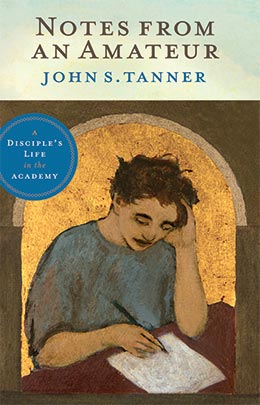Final Exams
John S. Tanner, Notes from an Ameteur: A Disciple’s Life in the Academy (Provo, UT: Religious Studies Center; Salt Lake City: Deseret Book, 2011), 31–3.
It is eleven days to Christmas and the first day of final exams. This is a stressful time for students and faculty alike. As a student, the Christmas season means writing papers and taking final exams. As a faculty member, it means grading papers and final exams. I always feel a bit like a Grinch until I finish grading my exams. All my children have memories of me reading stacks of blue books while the family prepared for Christmas. Final exams have long been part of the season for me, no less than carols and candy canes.
I believe in the pedagogical value of comprehensive final exams and culminating projects. These provide occasions for students to review, integrate, and apply what they have learned during the term. But they can be stressful, no doubt about it. Dr. Samuel Johnson said, “When a man knows he is to be hanged in a fortnight, it concentrates his mind wonderfully.” [1] The same could be said of taking final exams.
Final exams feed the anxiety dreams that disturb our students’ sleep long after their school days are over. The trauma resurfaces in dreams with familiar patterns. We dream of being expected to take finals in classes we have never attended. We dream of being unable to find the classroom or of showing up late for the exam. We dream of arriving for exams undressed—a not-too-subtle symbol of being unprepared. (This, by the way, actually happened to my friend. She arrived for a final in the old Joseph Smith Building only to discover, as she unbuttoned her overcoat, that she was wearing only a slip!)
Finals week leads me to reflect on the Final Judgment. What kind of final will that be, I wonder. I note that the scriptures are replete with potentially anxiety-producing images of a “great and dreadful day of the Lord” (Malachi 4:5) when there shall be “weeping and gnashing of teeth” (Matthew 24:51). The great parables of last judgment in Matthew 25 contain terrifying images of unprepared virgins having the door shut against them, of an unprofitable servant being stripped of his one talent and cast into outer darkness, and of surprised souls condemned to suffer everlasting fire for having failed to serve the “least of these my brethren” (Matthew 25:40). These parables potentially conjure nightmares of humiliation and failure far worse than those that haunt student anxiety dreams. Though the Lord may not grade on a curve, his standard of judgment can seem daunting nonetheless.
Yet we also know that he is a merciful judge unto the penitent. At the Final Judgment, each of us will need to rely on our Examiner’s mercy. George Herbert, my favorite devotional poet, writes of this in a poem entitled “Judgement,” one of several lyrics he wrote about what theologians call “last things.” In “Judgement,” Herbert imagines the moment when the “Almighty Judge” shall call for the poet’s individual book of life. Like the student who feels that other students are doing better than she, the poet has heard that some souls will present the Judge with a book of life “So void of sin, / That they in merit shall excel.” Not Herbert. When the Judge shall call for his book, Herbert resolves to “thrust a Testament into thy hand: / Let that be scanned. / There thou shalt find my faults are thine.” [2]
I too do not expect to ace the Final Judgment with a perfect score. I know that when I take my final Final Exam, after all I have done, I shall need a Headmaster’s mercy. I am grateful that Christ employs no proctor at the judgment bar exam because my hope for passing from this probationary school into a celestial degree of glory lies in someday being allowed to thrust a testament into his hand.
Notes
[1] James Boswell, Life of Johnson (Champaign, IL: Project Gutenberg, 1998), 238.
[2] George Herbert, “Judgement,” The Temple, in The Selected Poetry of George Herbert, ed. Joseph H. Summers (New York: New American Library, 1967), 253–54.
